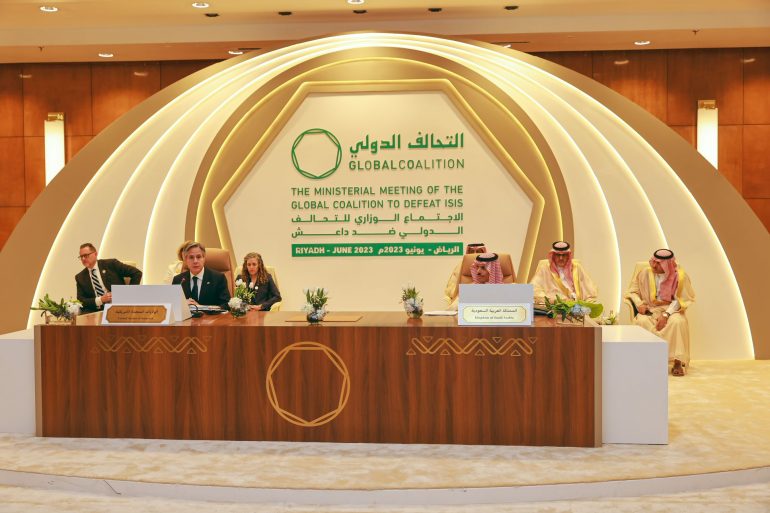The United States committed $148m on Thursday toward stabilization efforts in Iraq and Syria, as it urged Western states to repatriate foreign Islamic State (IS) fighters and their relatives. This pledge was made at a ministerial meeting of the international coalition against IS, co-hosted by Saudi Arabia and the United States, aiming to raise over $600m for a stabilization fund.
US Secretary of State Antony Blinken, who initiated a three-day visit to Saudi Arabia on Tuesday, announced the commitment, stating, “This support will meet critical needs that Syrians and Iraqis themselves have identified.”
Saudi Foreign Minister Prince Faisal bin Farhan expressed his discontent at the lack of repatriation action from wealthy countries, branding it as “disheartening and absolutely unacceptable.” He held talks separately with French Foreign Minister Catherine Colonna on the coalition meeting’s sidelines, who is expected to travel to Doha later Thursday for a strategic dialogue session.
The self-proclaimed IS caliphate that stretched across vast swathes of Iraq and Syria was defeated in 2019 after counter-offensives in both countries. However, thousands of jihadists and their family members are still held in detention centers and informal camps, fuelling concerns of a potential IS revival.
Despite consistent calls for repatriation, only a handful of foreign governments have permitted their citizens to return home, fearing potential security threats and domestic political backlash.
Blinken commended the countries that have repatriated their nationals from Syria, urging others to follow their lead. He highlighted the importance of repatriation to reduce the population in large informal camps like Syria’s Al-Hol, which houses 10,000 foreigners, including IS relatives.
The anti-IS coalition, formed in 2014 following the jihadists’ rapid advancement and increasing reports of atrocities in non-Muslim and Muslim areas alike, has warned that failing to repatriate foreign terrorist fighters could enable them to “take up arms and attempt to restore” the IS proto-state.
Despite its territorial defeat, IS militants continue to attack civilians and security forces in both Iraq and Syria. The United Nations estimates that IS still has between 5,000 to 7,000 loyalists across the two countries, approximately half of whom are fighters.
The UK, a fellow coalition member, will pledge more than $109m over the next five years to support stabilization efforts in Iraq and Kurdish-controlled northeastern Syria. This commitment comes in addition to $19.9m in aid over the next two years specifically addressing acute humanitarian needs in northeastern Syria.
On the eve of the coalition meeting, Blinken assured diplomats from Gulf Cooperation Council countries that the U.S. remains “deeply invested” in Gulf partnerships. Blinken’s visit to Saudi Arabia, a longtime ally, aims to boost ties amid the kingdom’s growing relations with Washington’s rivals.
Relations between the U.S. and Saudi Arabia have been tense recently, particularly over human rights and oil, after the U.S.’s requests for help in reducing soaring oil prices last year were rebuffed.
Blinken’s visit coincides with Saudi Arabia’s restored diplomatic ties with Iran, a country the West views with suspicion due to its contested nuclear activities and involvement in regional conflicts. On Tuesday, Iran reopened its embassy in Riyadh after seven years, with Iranian Deputy Foreign Minister Alireza Bigdeli hailing a “new era” in ties. That same day, the kingdom’s de facto ruler, Crown Prince Mohammed bin Salman, hosted Venezuelan President Nicolas Maduro, the leader of another oil power, which has a longstanding conflict with Washington. Prince
Mohammed bin Salman received a phone call from Russian President Vladimir Putin a day after meeting Blinken, with a focus on “preserving the stability of the global energy market.” Saudi Arabia has been attempting to prop up oil prices despite sagging global demand with multiple cuts to output in recent months.
AFP


